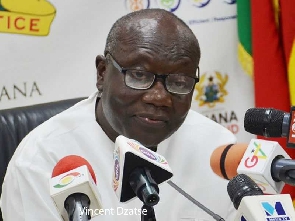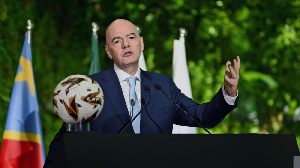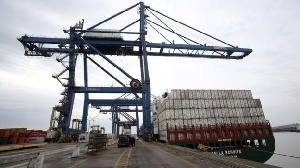The government has been advised to use a three-thronged approach of fiscal and structural adjustment and debt restructuring to ensure debt sustainability in the shortest time possible.
Specifically, the government has been urged to further cut down its expenditure, including reducing the number of Ministers by merging some ministries, to support debt sustainability for its US$3 billion International Monetary Fund (IMF) loan-support programme.
Professor Godfred Bokpin, Professor Peter Quarter and Dr John Kwakye – all eminent Ghanaian economists, said this in an exclusive interview with the Ghana News Agency on the ongoing DDE programme.
Additionally, efforts should be intensified to change the structure of the economy from being highly-import-driven by streamlining various sectorial agriculture, manufacturing and trade policies and implementing them effectively, they said.
They expressed confidence that the progress made on the DDE so far could lead to Ghana’s debt sustainability path to secure an Executive and Management Board of IMF by March 2023 for the US$3 billion loan-support programme.
However, the Economists stated that DDE programme alone, requiring bondholders to trade about 80 per cent of a total of GHS137 billion in bonds for new ones, could not secure debt sustainability.
They, therefore, asked the Government, to immediately reduce the number of ministers and merge some ministries to save money in addition to intensifying efforts to change the structure of the economy with prudent and sustainable initiatives to spur manufacturing and industrial growth.
Prof Bokpin of the University of Ghana Business School said efforts by the government such as the audit of Ghana’s COVID-19 expenditure and reaching some level of agreement with bondholders signalled a sign of progress on the DDE.
However, he said: “When your debt is judged to be unsustainable, measures for sustainability must be a triangle approach, which involves fiscal adjustment, structural adjustment and debt restructuring.”
He said: “If the president decides that he is going to have to reduce the size of the government by 50 per cent and also reduce the number of ministers, and merge some Ministries, Agencies, and Departments, we could have saved more than GHS10 bn.”
Prof Quartey, Director, Institute of Statistical, Social and Economic Research (ISSER) said the government, in addition to the proposed reduction in spending as put in 2023, should “go ahead and reduce the size of government.”
The ISSER Director said: “If we minimise waste, and corruption and ensure value for money in our expenditure, add value to our raw materials and support the agriculture value chain and manufacturing, we’ll be able to export more and get more foreign exchange and enhance our revenue mobilisation.”
“The Government should keep its focus, continue dialoguing and build consensus with the key stakeholders and ensure that we’re able to sign onto this IMF programme and get it running by the first quarter of this year.” He advised.
He added: “Hopefully when we sign onto the programme, we should make judicious use of the resources so, we’re able to grow the economy out of where we find ourselves. Once we do that, we can restore confidence and get our economy running.”
Dr Kwakye, Director of the Institute of Economic Affairs (IEA), noted that while the government urged bondholders to make some sacrifices, it was also prudent for it to do same.
“We believe the DDEP cost should be spread across the economy to the widest extent possible, in the spirit of burden-sharing,” he said and encouraged the Government to also make some sacrifices.
“All the borrowings that the government accumulated, the Finance Minister earned GHS160 million directly or indirectly, as part of burden sharing, why doesn’t he say, I’m also refunding 50 per cent?” He quizzed.
The DDE forms part of efforts by the government to assure the International Monetary Fund (IMF) of debt sustainability through creditors’ confidence by signing up for the programme, which has so far seen four postponements in the deadline as the government continues to engage stakeholders.
Individual bondholders and pension schemes have been exempted from the programme, though the Government has made new provisions for individual bondholders to be part of the DDE.
Business News of Sunday, 5 February 2023
Source: GNA
Government urged to use fiscal, structural adjustment to ensure debt sustainability
Opinions












